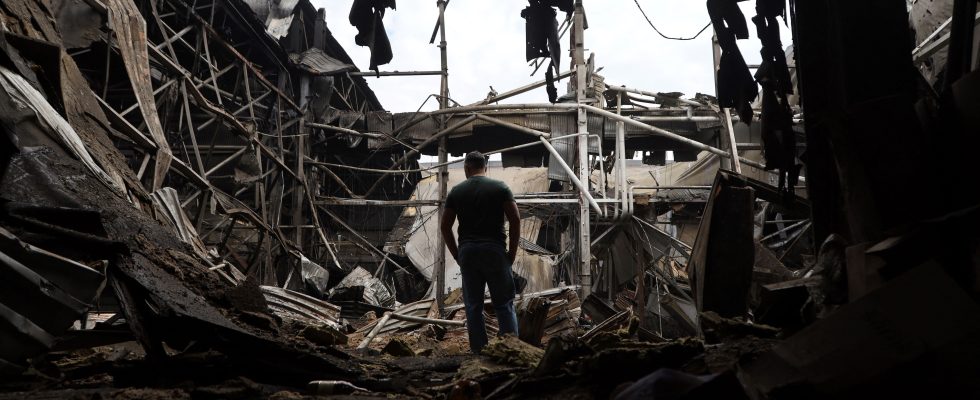“During the past night and in the morning, nine drones were detected over the territory of the Republic of Crimea. Six aircraft were shot down by anti-aircraft forces, while three others were disabled before landing,” said announced Sergei Aksionov, local governor of Crimea, a peninsula annexed by Russia.
One of the drones exploded in the village of Doukoutchayevo, in the center of the peninsula, smashing the windows of several houses, according to the same source. Drone attacks against Russian territory and the Crimean peninsula annexed in 2014 have increased in recent weeks, after the announcement of a counter-offensive by kyiv.
Ukraine says it shot down a missile and 20 Russian explosive drones overnight
The Ukrainian Air Force announced on Thursday June 15 that it had shot down a cruise missile and 20 explosive drones launched by Russia in a new night attack. Ukrainian forces managed to intercept one of four cruise missiles launched from the Caspian Sea. Three other missiles hit “industrial facilities in the Dnipropetrovsk region” (center-east), according to the same source.
Ukrainian forces continue their counter-offensive in Bakhmout and Zaporizhia
The Ukrainian counter-offensive continues. Kyiv forces continued their attacks on Russian positions on Wednesday, June 14. According to Ukrainian Deputy Defense Minister Hanna Malyar, the troops advanced between 200 and 500 meters on the Bakhmout front and between 300 and 350 meters in the direction of Zaporizhia.
The Red Cross was able to visit 1,500 Russian and Ukrainian prisoners
The International Committee of the Red Cross (ICRC) said on Wednesday it was able to visit 1,500 prisoners of war held by Russians and Ukrainians. “For prisoners of war and their families who have been able to share news, the impact is immeasurable,” said Ariane Bauer, ICRC regional director for Europe and Central Asia. The aim of these visits is to check the conditions of detention, to offer support and sometimes books or hygiene articles to the prisoners.
The headquarters of the organization is in Geneva. She was the target of repeated criticism from Ukrainian President Volodymyr Zelensky, who blamed her for not doing enough to gain access to Russian-held soldiers. The ICRC affirms that it has been able to visit the places of detention held by Moscow in recent weeks. So far, the organization has not had access to Russian-occupied areas despite “concrete requests”.
Pro-Russian hackers step up attacks in Switzerland
This Thursday, Ukrainian President Volodymyr Zelensky is expected to address the Swiss parliament on video, around 2 p.m. In parallel with this speech, a group of pro-Russian hackers is increasing cyberattacks in the country. They notably affected the cities of Zurich, Basel and Lausanne, temporarily preventing access to their websites. Other intrusions were observed on Monday and last week, in particular against the Swiss railway company (CFF).
“The author of the attack is the NoName group,” the Basel cantonal authorities announced in a press release. At the beginning of 2023, this group had already launched attacks against German institutions when Berlin authorized Poland to deliver Leopard 2 tanks to Ukraine, and during the Czech elections against the site of the Europhile and Atlanticist candidate Petr Pavel.
Australia blocks construction of new Russian embassy
The Australian government will oppose the construction of a new Russian embassy next to Parliament in Canberra, Prime Minister Anthony Albanese announced on Thursday. The country invokes in particular a risk to national security. “The government has received very clear security advice from the intelligence services about the risk posed by a new Russian presence so close to parliament,” he added.
Since 2008, Russia has been leasing a plot of land near Parliament in Canberra to an agency of the Australian federal government, and in 2011 obtained a permit to build its new embassy there. In August 2022, the government had tried to terminate the lease for non-compliance with certain clauses of the building permit, but this decision was canceled by federal justice last May. “We don’t think Russia is in a good position to talk about international law, given that it has so consistently and brazenly rejected it with its invasion of Ukraine,” said Anthony Albanese.
